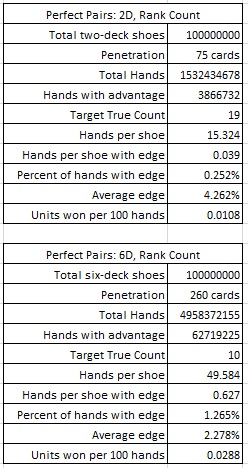Blackjack Average Hands Per Hour
- Blackjack Average Hands Per Hour Online Poker
- Blackjack Average Hands Per Hour Video Poker
- Blackjack Average Hands Per Hour Table
Gamblers who refuse to gamble unless the odds are in their favor are called “advantage gamblers”. But not all gambling games are possible to play with an edge. In fact, most casino games have ahouse edge that can’t be overcome.
Blackjack is one of the only exceptions. (Video poker is the other notable exception in the world of casino games, but gamblers can also bet on sports, poker, and horses and get an edge.)
The most famous advantage gambling technique in blackjack is counting cards, but that’s not the only way to get an edge. And even if you’re not counting cards, you can play a close to break-evengame if the rules options are generous to the player.
The first thing you’d need to figure out is how much money you need to live. Let’s assume you have a modest lifestyle and only need $48,000 a year to live. That means you need to win $4000 amonth (average) playing blackjack.
Lets assume you are dealt 100 hands per hour, so over the course of two hours you played 200 hands of blackjack. Getting a blackjack once every 21 hands means that you should theoretically have gotten about 10 blackjacks. Sometimes youll get more blackjacks in two hours of play, sometimes less, but on average youll get 10.
- Actually I did some more research last night after making this post and read that with a full table it's approx 60 hands per hour, 3 people about 80 per hour and one on one is about 120 per hour.
- How many cards are dealt per hand? The books tell us that the average hand in Blackjack (including the dealer hands) contains about 2.7 cards. I thought I would look at this a bit further. We always temper this estimate by saying that the number of players can affect the average because the dealer and players play differently.
Let’s also assume you’re a pretty good advantage player with an edge of 1% over the casino.
This means you need to make 100 X $4000, or $400,000 in wagers each month in order to cover your living expenses.
Let’s assume you play for $100 per hand. That means you need to make 4000 bets per month to earn that much money.
We’ll assume that you average 80 hands per hour (a typical number). You’ll see more hands per hour when there are no other players at the table with you, but you’ll also see fewer hands per hourwhen there are other players at the table.
Blackjack Average Hands Per Hour Online Poker
It will take you 50 hours of play per month to get 4000 bets down.
That’s 12.5 hours per week, which makes this a pretty fair part time job.

But you also need a large enough bankroll to withstand short term standard deviations, too. Just because you have a 1% edge doesn’t mean you’ll end every session with a win in that amount. You’llhave losing sessions and winning sessions.
Your bankroll must be large enough to handle those swings in fortune.
BETTING AT BLACKJACK
By Henry Tamburin
One of the most often asked question from blackjack players is 'how should I bet?' You've got several options and I'll discuss them in this article and offer my recommendation.
Flat bet
This means betting the same amount all the time. Most players don't like to bet this way because they figure if the dealer wins more hands then them they'll never win any money. Also players feel it's boring betting this way. They prefer the thrill of sometimes betting more in the hopes that when they do so, they will win the hand and make a nice profit.
Here are the facts on flat betting. If you bet say $5 on every hand in a standard multiple deck game the house will have an edge of 0.5% against the skilled basic strategy player. That means you will lose on average 0.5% of every wager you make. So if you bet $10 on every hand and average 80 hands per hour you will have made a total of $800 worth of bets. The casino expects to earn 0.5% of the $800 or $4.00. Of course the more likely result is that you'll win or lose much more than $4 after an hour of play. But on average you can expect over time to lose at the rate of $4 per hour.
Let's take an example of a player flat betting $10 on every hand. It's is a conservative betting strategy that leads to a relatively low theoretical loss rate. The fluctuation in this player's bankroll will also be low which means the likelihood he'll have a big winning or losing session is not great.
Progressive betting


This is where things get interesting. Progressive betting means varying your bets in some way from one hand to the next rather than always betting the same amount on every hand. There are all different types of betting progressions but they all have one common denominator. You either decrease or increase your next bet depending upon whether the hand you just played won or lose.
Blackjack Average Hands Per Hour Video Poker
Win progressions encourage you to increase your bet size after a winning hand. For example you make a minimum bet of $10 and if you win, you raise your next stakes on next hand to $20.
There are all different kinds of win progressions. The most common is a 1-2-3-5 progression. This means you increase your bet by the above multiples after each winning hand but as soon as you experience a loss, you start the progression over with a 1 unit bet.
Proponents of win progressions will tell you that you'll win more money if you win 5 consecutive hands compared to the amount you lose if you lose 5 consecutive hands. Of course what they don't tell you is that you never know when that 5 consecutive winning hand streak will occur.
There are also betting progressions in which you increase your bet following a loss. These Martingale type betting progression are dangerous and you never consider using them
There is also hybrid betting progressions, which have you increase your bets following a win, but after two or three success wins you lock up some profit and gradually regress your bets. The creativity of progressive bettors is never ending.
First of all, betting progressions do not change the 0.5% house edge one iota. There has never been a correlation between the hand just won (or lost) and you chance of winning the next hand. In other words using the criteria of the result of one hand (W/L) to base how you bet on the next hand has no scientific validity. So betting progressions in the long run don't work in the sense that won't improve your long-term chances of winning.

But here's what betting progressions will do. First off they increase the fluctuation in your session bankroll compared to flat betting. This means you can win more using a betting progression compared to flat betting but you can also lose more. Secondly, betting progressions will increase the amount of money you wager per hour compared to flat betting. If a $10 bettor uses a 1-2-3-5 betting progression, his average bet will $20. Over an hour he will average $20 times 80 hands or $1600 worth of bets. The casinos expected win is 0.5% of $1600 or $8. In other words a $10 progressive bettor stands to lose twice as much per hour as a $10 flat bettor.
Here's a tip to save you some money in the long run if you insist on using a betting progression. Instead of starting your progression at $10, start at a lower amount (ie. $5). This will reduce your average bet to $10 per hour and cut you hourly theoretical loss rate in half.
But in the long run flat betting and betting progressions don't work in the sense they won't change the house edge against you and you will lose in the long run. So what betting system works? That my friends is as card counting.
With card counting you know when you have the edge based on the change in the composition of the decks and therefore you'll know when it's the right time to bet more. So unlike betting progressions that are based on whether you win or lose the previous hands, card counting is based on the mix of cards that were played on previous hands. If more small value cards were played in previous rounds, there are more big value cards left in the unplayed cards and the edge shifts from dealer to player. This would be the best time to bet more.
Blackjack Average Hands Per Hour Table
But I'm realist. Not a whole lot of average blackjack players have the time or mental concentration during play that is required to master one of the popular point count card counting systems. These are readily available in blackjack books. But even though millions of blackjack books have been sold since Ed Thorp's classic book, Beat The Dealer (circa 1962) first revealed card counting to the masses, the number of players who can successful win money in the long run at blackjack number in the hundreds and thousands.

So what's the answer to betting at blackjack for the average player? I asked Don Pronovost that same question about 2 years ago. Don is a software developer that markets blackjack training software (www.HandheldBlackjack.com). He spent the better part of 2 years and 36+ billion computer simulated hands looking for the solution to this dilemma. What he developed is nothing short of revolutionary - Speed Count.
Speed Count is unlike any conventional card counting system. It's much simpler to master and requires much less concentration when you play. And unlike progressive betting systems, Speed Count will give you a verifiable advantage over the casino. Frank SCoblete and I teach Speed Count in a weekend course. For more information visit www.goldentouchblackjack.com or call 1-866-WIN-BJ21.
So now that you know the scoop on betting at blackjack, I wish you many aces and faces the next time you play.